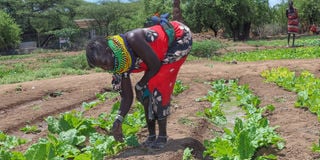Pastoralists in drought-prone Turkana village diversify into farming to fight malnutrition

Ms Areng Arii tending to her vegetables in Longolemwar village, in Turkana North. Her farm relies on a 30,000-litres elevated steel for water.
What you need to know:
- For the past three decades, Mr Nabali has been dependent on livestock, which get wiped out whenever there is a prolonged drought.
Growing up as a pastoralist, Etukon Nabali, a resident of Longolemwar village in Turkana North, never thought he would one day start farming and grow vegetables for family consumption.
The only vegetable he knew of was cabbage, which he would buy at Kaikor Centre; having walked for more than 10 kilometers.Cabbages are not grown in Turkana. They are sourced from Kitale, some 300 kilometers from Lodwar, before being transported to Kaikor, another 200 kilometres. This journey depends on the availability of passengers or other goods - enough to cater for fuel, maintenance cost of the vehicle, driver's wages and profit.
For the past three decades, Mr Nabali has been dependent on livestock, which get wiped out whenever there is a prolonged drought.
"Without livestock, we face hunger and starvation, resulting in high cases of malnutrition as the relief food we mostly receive is mainly cereals," Mr Nabali said.
But the narrative has changed.
For the first time ever, the remote village has small farms dotted with leafy green vegetables like spinach and kales after Turkana County government with support from the USAID Nawiri project invested in a water project that has seen Mr Nabali and his neighbours’ homesteads served with piped water from a 30,000-litres elevated steel.
"I now have enough water for my livestock and household. I have established a farm where I grow vegetables that I previously would only see twice a year when I got a chance to travel to towns such as Lodwar and Kakuma," he proudly said as he removed weeds from his maturing spinach.
Women in the village have also been advised by nutritionists at their local dispensary to utilise the water to grow highly nutritious vegetables as part of efforts to tackle high malnutrition rates.
Ms Areng Arii, a mother of four, said ever since the water project was handed to them more than eight months ago, she has ventured into farming, which is paying off.
"Long'olemwar village has transformed from a food-scarce area to a land of an abundant supply of fresh farm produce that is sold at Kaikor center," Ms Arii said.
She is now commonly referred to as ‘Mama Mboga’, a name she had never related with since she was born.
Mr Gabriel Ekuwam, USAID Nawiri field director, said their approach to promoting crop production in the far-flung villages has been motivated by the desire to bridge the initial access gap that limited the community's ability to purchase and utilise vegetables.
"These efforts will go a long way in ensuring that locals diversify their meals. This will translate into a sustainable reduction in malnutrition," Mr Ekuwam said.
He noted that more full-time pastoralists are now embracing farming as an alternative source of livelihood because of the availability of adequate water.
Area MP Ekuwom Nabuin noted that another remote village called Naurendiria needs co-investment to tackle food insecurity.
"The village has three boreholes but water has never been utilised due to its salinity. The land there is flat and fertile, and the community usually does little farming along the river during the rainy season. The community needs to be assisted to boost crop production just like Longolemwar," Mr Nabuin said.





